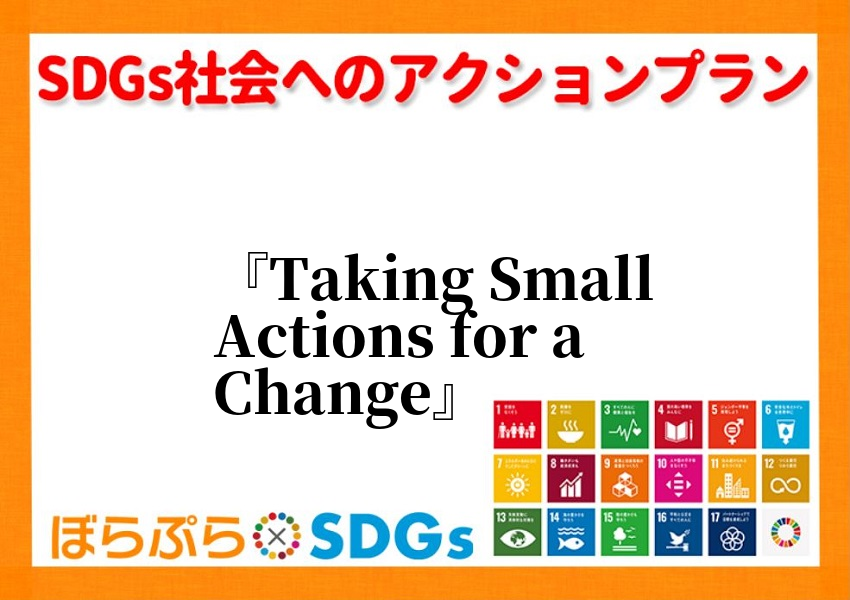[ぼらぷらアクションプラン]

プレゼン資料
※動画内のスライドが見にくい方は、こちらをご確認ください
アクションプラン
『Taking Small Actions for a Change』
Amid the information society and advanced technology, billions of people are now able to lead a richer and more comfortable life than ever. According to a data from “THE WORLD BANK”, the number of people living below the international poverty line of $1.90 a day had decreased by over 50%; down to 700 million from 1990 through 2017. Sadly, owing to the COVID-19 pandemic, the number has swelled back especially among developing countries since 2020. However, considering the fact that “poverty” has apparently come to light once again due to COVID-19, we could now make the most of this opportunity to tackle poverty, one of the 17 goals of the SDGs.
In order to combat poverty across the globe, I think it crucial to figure out why poverty occurs in the first place. Let’s take the real situation of poverty in Cambodia as an example, along with the country’s brief history. In the 1970s, Cambodia confronted “The Cambodian genocide” conducted by Khmer Rouge, as well as the civil war that broken out during the same era. Fortunately, the urban areas showed a significant redevelopment after these tragedies. In contrast, the rural regions were left behind. Since then, the economic disparity among people in Cambodia has widened, and the gap between the rich and the poor has become one of the country’s major problems today. Due to the lack of education in rural areas, people there are living from hand to mouth for they are only capable of physical labour with an unstable income, and their children are also giving up their education to help their parents. Shockingly, more than 37% of children in Cambodia are working as child labourers according to “THE STATE OF THE WORLD’S CHILDREN 2013.” Some children even commit crimes such as robbery to make their living. This clearly indicates that one of the fundamental factors of poverty should be “the lack of education.” Without adequate education, people have no choice but to have jobs that offer minimum wages, have financial shortages, are unable to send their children to school, and like so the vicious cycle continues. However, if we broaden our view, we could also say that poverty is accompanied by famine, discrimination and other factors, indicating that “poverty” is in fact a highly complicated issue that we have to tackle from various aspects. In other words, we can take diverse approaches toward it. For instance, by donating 357 yen to UNICEF, 10 sets of pencil and notebook will be given to children in developing countries. In fact, over 43 million children have received school supplies through UNICEF’s donations so far, which proves that even a small donation will accumulate to an immeasurable result. While donating is a simple but great way to be the help in society, I consider “volunteering” the most fascinating way for two reasons. Firstly, the experience itself contains full of new discoveries for volunteers. Through my experience of teaching Japanese to Cambodian children online as a volunteer, I’ve encountered moments I will never forget. I once asked a girl a question: “What do you wish to have right now?” and she answered, “I want a pen and a notebook.” Her honest words hit me hard in my chest, and I suddenly became awake that such inequalities exist in every moment, and that I should never take those supplies for granted. This is when “volunteering” changed the way of my thinking. Secondly, you will likely influence the people around you. According to a 2017 survey targeted 10,000 students in Japan, over 60% of the students showed an interest in volunteering, while only 30% of them had actually volunteered. Interestingly, out of those 30%, approximately 1 in 3 students said they started volunteering due to the influence of their families and friends. This means that even a single person could ultimately influence countless people by volunteering, or probably through other actions as well.
Overall, if we take the advantage of our advanced technologies, we can now work towards a series of social problems including “poverty” in so many ways, from donating, online volunteering and even sharing information through SNS. What I can do is to keep on volunteering, keep on taking actions no matter how small they are, and influence the people around me. Although each of our actions may seem powerless, it isn’t. When each of our actions accumulates, it will definitely make a big change in the world.
未来型 海外ボランティア 研修を受講した感想
総合的な満足度
大変満足

受講前の気持ち
コロナ下でもできるボランティア活動を探していた、人の役に立ちたい、将来の進路に活かしたい、子どもたちと交流がしたい、社会問題に興味がある
受講後の気持ち
すごく良かった!
視野が広がった!
勉強になった!
いい経験になった!
研修を受講した理由を教えて下さい
ボランティア活動に興味があり、インターネットで情報収集を行ったところ、ボラプラの「未来型海外ボランティア」の存在を知った。自宅にいながら世界の子供たちと交流ができるという事を魅力に思い、申し込んだ。
研修を受講した感想は?
当初は子供たちと上手く交流できるか不安が大きかったが、授業本番ではその様な不安など忘れ、終始楽しむことができた。未来型ボランティアでの経験のおかげでボランティア活動をより身近なものとして見る事ができる様になり、自分の活動の幅が広がったと感じている。
今後、今回の経験をどのように活かしていきたいですか?
今回の経験を糧に、他にも様々なボランティアに参加するなど行動範囲をどんどん広げていきたい。
これから受講される方へアドバイスお願いします!
とても良い経験になるので、迷っている方はぜひ参加してみてください!
ぼらぷらへ応援メッセージ
会員様から頂いたメッセージは私達にとって何よりの励みになります!!
4ヶ月間、充実したサポートやサービスを提供してくださり、本当にありがとうございました。ボランティアを通して充実した時間を得ることができ、プログラムに参加して良かったと改めて感じております。またの機会があればどうぞよろしくお願いします。






 LINE相談
LINE相談